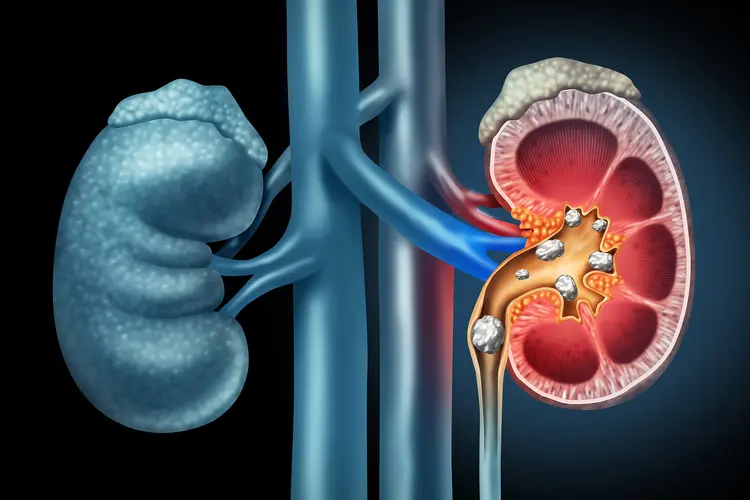Kidney stones are one of the most common urological conditions, affecting millions of people worldwide each year. They are hard, crystalline deposits that form inside the kidneys when certain substances in the urine—such as calcium, oxalate, and uric acid—become too concentrated. While both men and women can develop kidney stones, research consistently shows that men are more predisposed to them. Understanding the kidney stones causes is crucial for prevention and long-term kidney health.
What Are Kidney Stones?
Before diving into the causes, it’s important to understand what kidney stones actually are. Kidney stones, also known as renal calculi, form when minerals and salts crystallize and clump together inside the kidneys. Depending on their size, they may pass through the urinary tract unnoticed, or they can cause severe pain, nausea, and urinary complications.
Common Kidney Stones Causes
Several factors contribute to the formation of kidney stones. The most common kidney stones causes include:
- Dehydration
One of the leading causes is insufficient water intake. When the body is dehydrated, urine becomes more concentrated, allowing minerals and salts to crystallize and form stones. - High Sodium Intake
A diet high in sodium increases calcium in the urine, which in turn raises the risk of calcium-based kidney stones. Processed foods, canned soups, and fast food are common culprits. - Excess Animal Protein
Diets rich in red meat, eggs, and seafood can increase uric acid levels. Elevated uric acid promotes stone formation, especially uric acid stones. - Oxalate-Rich Foods
Spinach, nuts, beets, and chocolate are high in oxalates, which can combine with calcium in the urine to form calcium oxalate stones—the most common type of kidney stones. - Genetic Predisposition
Family history plays a significant role. If kidney stones run in your family, you’re at a higher risk of developing them. - Medical Conditions
Conditions such as obesity, diabetes, gout, and hyperparathyroidism are linked to a greater likelihood of kidney stones. - Certain Medications and Supplements
Overuse of calcium-based antacids, vitamin D supplements, and certain medications like diuretics can contribute to stone formation.
Why Men Are More Prone to Kidney Stones
While the kidney stones causes affect both genders, studies reveal men are more likely to develop them than women. There are several reasons for this:
- Higher Protein Consumption: On average, men consume more animal protein, which elevates uric acid levels and stone risk.
- Hormonal Differences: Testosterone may play a role in increasing stone risk, while estrogen in women appears to provide some protective effects.
- Lifestyle Choices: Men are statistically more likely to engage in habits that raise risk, such as higher sodium intake, lower water consumption, and greater alcohol use.
- Obesity Rates: Though obesity affects both genders, its association with kidney stones is stronger in men due to differences in fat metabolism.
Symptoms of Kidney Stones
Understanding the kidney stones causes is important, but so is recognizing the symptoms. Common signs include:
- Severe pain in the back, side, or lower abdomen
- Blood in the urine
- Nausea or vomiting
- Frequent urge to urinate or painful urination
- Cloudy or foul-smelling urine
Anyone experiencing these symptoms should seek medical attention promptly, as untreated stones can lead to kidney damage or infections.
Preventing Kidney Stones
Prevention is possible, especially once the kidney stones causes are understood. Here are practical steps to lower risk:
- Stay Hydrated: Drinking at least 8–10 glasses of water daily helps dilute urine and prevent stone-forming minerals from crystallizing.
- Reduce Sodium: Limiting salty snacks, canned foods, and processed meals reduces calcium in urine.
- Limit Animal Protein: Moderating red meat, fish, and eggs lowers uric acid buildup.
- Balance Calcium Intake: Don’t eliminate calcium; instead, aim for dietary sources like yogurt and leafy greens, which bind oxalates in the gut before they reach the kidneys.
- Avoid Excessive Supplements: Take vitamins and minerals in moderation, especially calcium and vitamin D.
- Eat More Fruits and Vegetables: A plant-rich diet reduces acidity in urine, lowering stone risk.
- Maintain Healthy Weight: Managing weight through balanced nutrition and exercise reduces the risk associated with obesity and diabetes.
Long-Term Outlook
Kidney stones may be common, but they are not inevitable. By understanding the kidney stones causes and making targeted lifestyle changes, the risk can be significantly reduced. Men, in particular, should be mindful of their dietary habits, hydration levels, and overall kidney health.
For those with recurrent stones, consulting a healthcare provider is essential. Sometimes, specialized urine tests or imaging may be needed to determine the underlying cause and guide prevention strategies.
Final Thoughts
Kidney stones are a painful condition, but knowledge is a powerful tool in prevention. While dehydration, diet, genetics, and lifestyle are common kidney stones causes, men are more predisposed due to hormonal and behavioral factors. By adopting healthy habits—drinking more water, reducing sodium, limiting animal protein, and managing weight—individuals can take meaningful steps to protect their kidney health.



